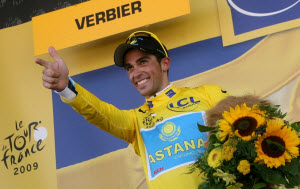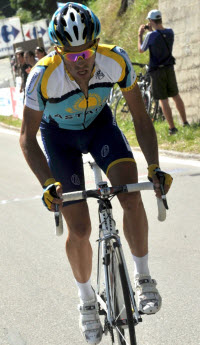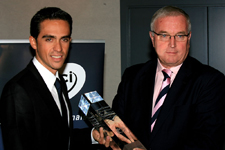 As the year heads towards an end, Tour de France champion Alberto Contador has been reflecting on the 2009 season and looking ahead to 2010. It was a tough year for the Spaniard, but also a very rewarding one; he won his second Tour de France, of course, and thus his fourth Grand Tour, but also showed strongly in other races.
As the year heads towards an end, Tour de France champion Alberto Contador has been reflecting on the 2009 season and looking ahead to 2010. It was a tough year for the Spaniard, but also a very rewarding one; he won his second Tour de France, of course, and thus his fourth Grand Tour, but also showed strongly in other races.
Proving he is a rider who can perform well from the start of the season, he collected a stage and the overall victory in the Volta ao Algarve, two stages in Paris-Nice, two stages and the general classification in the Vuelta al País Vasco, third in the Dauphiné Libéré, and finished the year as the number one in the UCI’s world ranking.
“It will be hard to match…I not only won the Tour, which was my goal, but I also was battling in every race in which I participated and got very good results,” the 27 year old told the Spanish newspaper AS. “This earned me the Velo d’Or and the UCI number one ranking. You can not ask for more. I think it was the best season of my career. And also the most difficult.”
The difficulty he refers to mainly relates to the Tour de France, and what was a very tense relationship with seven-time winner Lance Armstrong. Their struggle for team leadership divided Astana, and by the end of the race there were clear signs that things would never be the same.
After the Tour it was reported that Contador was twice left without a team car; the first time was before the final time trial, and the second was coming off Mont Ventoux. He also confirmed after the race that he had to buy his own wheels before the Monaco time trial, as the ones he wanted were not given to him.
 “They could not think clearly, evidently,” he said. “But even if I had to buy it [the wheels], I could have the best material. And I didn’t miss the car much, because my brother was with me at all times…not just to drive me.
“They could not think clearly, evidently,” he said. “But even if I had to buy it [the wheels], I could have the best material. And I didn’t miss the car much, because my brother was with me at all times…not just to drive me.
“The Tour is over. It was hard both physically and psychologically, but I was prepared. I sensed how things would develop.”
After the race the psychological battles continued, and much was made of the fact that eight of the nine Tour de France riders moved to RadioShack. Only Contador remained with Astana, with even his room-mate and friend Sergio Paulinho jumping ship.
It’s been portrayed by some as a choice between personalities, the clear suggestion being that the riders picked Armstrong and Johan Bruyneel over the young Spaniard. He suggests otherwise.
“It was a logical decision. And I understand. RadioShack offered a project that is solid and well paid. I could offer them nothing. Until mid-December, I had no team.
“Despite everything, I feel privileged. True, every winter something happens, I have no contract, we are not going to the Tour, Armstrong coming back, I have no team … I miss a little bit of peace, but it never affects my training. When I have had stability, I don’t have the same results.”
Looking ahead to 2010:
Contador has won the past four Grand Tours that he has entered. He’s also the youngest rider ever to take the Tour de France, the Giro d’Italia and the Vuelta a España, and achieved that triple in the shortest amount of time in the history of the sport.
His absolute goal for 2010 will be to take his third Tour, and he is encouraged by the route. “This year is harder, for the climbers,” he said. “It has more mountains and is more demanding. That’s good for me and good for Andy Schleck.”
Asked whether he ranks Schleck – this year’s runner up – or Armstrong, third, as a bigger rival, he doesn’t hesitate. “Andy will be the toughest in the mountains. He will come with more maturity and experience, and certainly we will have several hand-to-hand battles. But in this Tour there will be many great rivals, such as Leipheimer and Klöden.
“Lance also has his options, of course. He came third this year, has a lot of experience and a great team.”
 One of the stages that his supporters will be most concerned about is the race to Porte du Hainaut on day four. Contador showed in 2009 that he was the strongest in the mountains, and also the best of the general classification riders in the time trial; however, he has almost no experience of racing on cobblestones and, weighing less than 65 kilos, he is not really built for that sort of terrain.
One of the stages that his supporters will be most concerned about is the race to Porte du Hainaut on day four. Contador showed in 2009 that he was the strongest in the mountains, and also the best of the general classification riders in the time trial; however, he has almost no experience of racing on cobblestones and, weighing less than 65 kilos, he is not really built for that sort of terrain.
However, he said that he is not unduly concerned about the stage, other than staying out of trouble. “I worry about a crash. There will be a big fight to get to the front before the pave. Everyone will want to be ahead. This will generate a lot of tension and danger. I’ll try to approach that as normally as possible and avoid facing excessive risk. It’s better to lose a little – if you lose some time, you can get it back. If you suffer a crash, it might be irreversible.”
Contador feels that there is not one stage that stands out as a clear danger. “None in particular and all in general,” he said, when asked which one he’ll be most nervous about. “You can not predict where there will be wind. Days which in principal are normal ones could be crucial for the general classification and the interests of various riders.”
The GC battle will most likely conclude with a 51 kilometre time trial on the penultimate day; he won the final race against the clock this year, but it was shorter. He’d prefer if the TT was a similar distance, but if the form is there he’ll be fine.
“I go better when it’s not longer than 40 kilometres, but in that moment it will depend more on the form that you have left. If I am strong, I can push hard,” he explains.
Perhaps the biggest test will be how Astana performs. The 2010 version will be very different to this year’s squad; more unified, perhaps, but on paper the quality of riders is not the same. Right now, he’s not too concerned.
“We have to see how it works. I have a lot of confidence in my team-mates. Taking the race lead is always difficult for everyone. There are many circumstances that influence the race and we cannot control them all. I will try to be 100% prepared and motivated. Then we’ll see.”
Despite reports that he would only remain with Astana if Alexandre Vinokourov was not on the Tour team, it appears that all is well between the two. In fact, he says it will be a big plus if he is at the race.
“He will be an important asset. He is a reference and a teacher for the Kazakh riders. He will be a key man in the team’s strategy. We have a great relationship and I see him as being very committed. Of course he will have ambitions, but they are compatible with mine. If Vino is in the Tour, that will be a great advantage.”